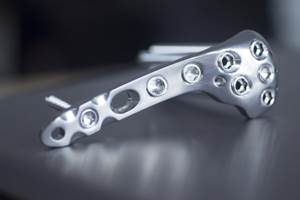German Project Yields Three New Medical Machining Processes
Trends to Watch at IMTS: Recent research has resulted in a new mix of high-speed turn whirl milling, polygon turning and rotational turning for manufacturing medical bone screws and out-of-round nails.
Share






Eccentric turning uses a rotating, noncircular tool guided along a rotating workpiece to produce an out-of-round shape common for modern medical bone nails. Source: Production Machining
Modern medical implants for orthopedics, traumatology and dental technology are characterized by rigorous demands on strength, biocompatibility and bionic-optimized geometry. The geometry of an implant is adapted to the bone and tissue. In the process, the functional surfaces of the implants are given an increasingly sophisticated design in order to facilitate their attachment in the body and make them less invasive for the patient. The new designs of implants drive up manufacturing costs because the surfaces are no longer circular or square. They have more curved surfaces and functional elements with continuous transitions in a very small space. In particular, the need for several manufacturing steps on different machines causes costs to rise significantly. For example, precise handling for exact reclamping of a workpiece represents a considerable cost factor. Therefore, despite the high level of functional integration, an efficient process route is needed for economical production.
ZykloMed is a joint project funded by Germany’s (BMBF) including participating partners , , Beutter Präzisions-Komponenten GmbH and the wbk Institute for Production Engineering at the Karlsruhe Institute of Technology (KIT). The project’s goal was to develop new manufacturing processes for the economical machining of medical implants with multifunctional and non-round bionic designs. The three manufacturing processes developed were eccentric turning, polygon turning and turn-whirl milling.
These three processes are all based on the same kinematic principle of multiple synchronized rotating axes. While this principle is well known, its application to noncircular and curved shapes is highly demanding. At the same time, the practical implementation must meet the high quality requirements of the medical industry.
The project partners researched and developed manufacturing procedures along the entire process and supply chain, from the machines and control technology to the tool design to prototype and pre-series production. The manufacturing processes were simulated and designed based on known methods with the same mathematical principles to determine the requirements for tool and machine. The tests were divided into equivalence tests under laboratory conditions, as well as pre-series tests in laboratory and near-application environments. The engineers focused on both machine and tool technology for the development and design of the following three processes:
- Turn-whirl milling is a productive process for producing threads for bone screws. One or two circular milling cutters are set at a certain angle to the workpiece. The directions of rotation of the cutters and the workpiece can be the same or opposite. The speed ratio of the workpiece to the two cutters depends on the number of screw threads and the number of cutter inserts. The process can be used to economically produce threads with a true variable pitch by dynamically changing the thread profile.
- Polygon turning is a process for producing noncircular external and internal contours with a hypotrochoid shape. Like rotary eccentric turning, the process offers the possibility of producing noncircular contours on lathes. During the process, the parallel axes of the workpiece and the tool are offset from each other by an axial distance and are brought into a specific speed ratio under positional coupling. The axial distance — the speed ratio of the workpiece to the tool and the cutting diameter of the inserts — define the dimension of the contour. A tool system for polygon turning is individually adapted to the contour of the workpiece to be produced.
- Eccentric turning uses a rotating, noncircular tool guided along a rotating workpiece under positional coupling. The speeds are brought into a certain ratio to each other and the out-of-round shape is thus reproduced. The process is said to offer highly productive production of eccentric outer contours, and the rotation of the tool reduces the thermal load at the cutting edge to extend tool life. The process also enables the production of tapered profiles, making it well suited for bone nails.
With successful tests in a near-series production environment, the ZykloMed partners have come a big step closer to the goal of economic production of implants of multifunctional and non-round bionic design. The engineers proved that the synchronized manufacturing processes enable the economic production of modern implants. In addition to the production of new component geometries, the processes also offer optimization potential for the economic production of existing implants, as well as possible applications beyond the medical industry.
Related Content
Kennametal Turning Tools Enhance Small Part, Medical Machining
TopSwiss Micro Boring Solid tooling and KCU25B turning inserts are well suited for the small parts and medical machining space.
Read MoreThe Four Phases of a Manufacturer’s Automation Evolution
With more and more automation options available for manufacturers, how do shops figure out what works best? Medical manufacturer rms Company has acquired robot arms, AGVs, pallet changers and software, and while it has found success with all, it has learned how some solutions meet its particular needs better than others.
Read MoreKyzen Solvents Provide Ease of Cleaning for Medical Parts
The Metalnox line of solvent products are designed to improve reliability and increase the ease of cleaning in vacuum and vapor degreasing processes.
Read MoreThe Producto Group Appoints New Member to Board of Directors
Dean Schauer, the newest appointee to the company’s board of directors, is the current CEO and president of Confluent Medical Technologies.
Read MoreRead Next
AMRs Are Moving Into Manufacturing: Considerations for Implementation
AMRs can provide a flexible, easy-to-use automation platform so long as manufacturers choose a suitable task and prepare their facilities.
Read MoreMachine Shop MBA
Making Chips and 91ÊÓƵÍøÕ¾ÎÛ are teaming up for a new podcast series called Machine Shop MBA—designed to help manufacturers measure their success against the industry’s best. Through the lens of the Top Shops benchmarking program, the series explores the KPIs that set high-performing shops apart, from machine utilization and first-pass yield to employee engagement and revenue per employee.
Read MoreLast Chance! 2025 Top Shops Benchmarking Survey Still Open Through April 30
Don’t miss out! 91ÊÓƵÍøÕ¾ÎÛ's Top Shops Benchmarking Survey is still open — but not for long. This is your last chance to a receive free, customized benchmarking report that includes actionable feedback across several shopfloor and business metrics.
Read More























